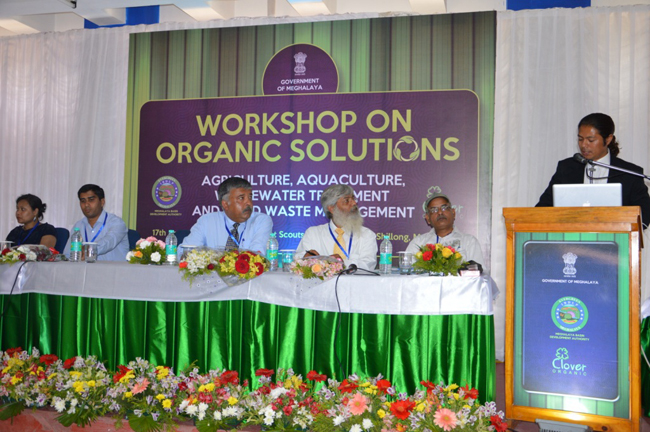
The Meghalaya Integrated Basin Development & Livelihood Promotion Programme (IBDLP) is taking forward its role to promote optimal and effective development and utilization of basin resources within a framework of sustainable development. To achieve this it becomes necessary to hold on to what we have and in this case, this translates to our fresh water. Waste management thus comes to the fore as this is the key to keeping our rivers and lakes clean.
Keeping this in view, Clover Organic Pvt. Ltd., Dehradun had been invited by the Meghalaya Basin Development Authority (MBDA) to spread awareness on this point of view amongst others. A one day workshop was organized on the 17th of April, 2014 at the Meghalaya Bharat Scouts and Guides, Laban. The workshop was titled as “Workshop on organic solutions: Agriculture, aquaculture, wastewater treatment and solid waste management.” The Chief Guest at the workshop was Shri C.V.D. Diengdoh, IAS, SDO Sohra, the dais consisted of Dr. J. Lyngdoh, Shri S. Agarwal, CEO and Founder of Clover Organic Pvt.Ltd., Dr. G. Roy, V.P, Clover Organic Pvt. Ltd., Dr. R.A. Ram, Principal Scientist of Clover Organic Pvt. Ltd and Shri. S. Kumar, Area Sales Manager, Organic Solution Pvt. Ltd. Shri. S. Agarwal was quick to mention that “Meghalaya has the potential of a titanium mine” in relation to the resources it possess but what was the need of the hour is “the right path and not to pollute the environment in any way”. He spoke on the unconventional use of microbes to help clean the river systems and lakes in Meghalaya as technology was not always feasible with regards to finances.
The participants at the workshop included several NGOs form around the city such as Synjuk Ki Rangbah Shnong, other participants included officers from different line departments and various socially responsible members of the society.
Two technical sessions followed the inauguration session. The first was on waste water treatment. Presentations were made by Clover Organic on the Trout Farm and Umshing River in Shillong as potential areas where unconventional waste management systems could be implemented by using microbes and floating islands. These two areas could be used as examples for the future use of microbes and floating islands in saving river systems and lakes in Meghalaya. Other issues discussed were on innovative and ecological solutions for agriculture.
The second technical session was on landless or small holding entrepreneurs. This session focused more on how to maximize land productivity. Presentations on different techniques of farming to increase production by optimizing land use such as vertical farming were shown. There was also a discussion on improving institutional setups for aiding the farmer and revitalizing fruit cultivation in the state.